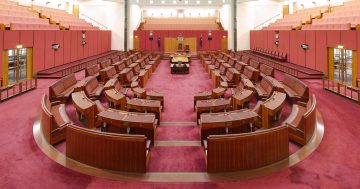
What does democracy mean to you?
In a recent article on election funding, a Riotact contributor made the assertion that [in the ACT] democracy was not delivering. My response was that it was but that it wasn’t delivering what he/she wanted. But that got me thinking about whether democracy was working here or not.
Interestingly, democracy was invented by the Greeks and when their civilization fell apart it kind of disappeared in favour of dictators, empires, monarchies, chiefdoms or feudal lordships. It was only about a hundred years ago or so that democracy emerged as an alternative governance system and even then it was challenged by the notion of socialism or communism, constitutional monarchism or dictatorships.
Heywood, in Political Ideologies (2007) gave a definition of democracy as “a political system that allows the constituents and citizens of a country the right to fairly vote and contribute to the decision of which individuals are ruling and are the governing power. Not only that but [it] provides citizens protection from the state”.
Heywood, in Politics (2007) also iterated the bit from Abraham Lincoln when Lincoln said that democracy is “a government of the people; for the people, by the people”.
Well, we certainly don’t have a dictatorship. Some say we are actually a part of a monarchy but for me, the People’s Republic of the ACT owes its allegiance to the people, even if the boys on the hill have a power of veto. And we sure as hell are not a communist state. So I guess we can call ourselves a democracy, but do we conform to the actual theory of a democracy? I think not.
We can keep the fellows honest and collectively boot them out if they don’t perform. Our Assembly is, in fact, a forum of competing political ideologies and forces and is a forum for discussion and decision. But only on the big picture stuff. The detail is left to ministers and bureaucracies.
I would argue that this means that the citizenry appears not to have a role to play in the everyday decision making in a real sense.
But Lincoln’s bit says governance “by the people”, suggesting a greater role than mere delegation of decision making power.
An observer of the issues raised in august publications like this one, and its competitors such as the Fairfax press and Murdock shock stock and TV and radio sensationalist stories of woe, will see a common thread. It is that there are groups of people who feel alienated from decisions which are affecting them detrimentally.
The complaints about “lack of consultation” on planning decisions, (which is really that the complainants didn’t agree with the decision makers view) is a common, almost boringly constant, complaint. An example is the gnashing of teeth against the decision on light rail which has its mirror in the gnashing of teeth for light rail in the early 2000s election campaigns by proponents of the light rail system.
So let’s look at how decisions on everyday stuff actually occur.
The ministers make decisions based on advice from either the bureaucracy or private enterprise. These decisions are given effect by the same bureaucracies which advised a course of action. Sometimes, as mandated in legislation, either an Act or subordinate legislation, a course of community consultation will occur. This can be public meetings, pamphlets in a letterbox, articles in the media, print, electronic or social, or focus group. In the plethora of daily decisions on matters community, actual consultation is rarely engaged. Decisions are taken by certain officers with delegation from on high and that’s that!
So in the vast decision-making activity of governance, the making of decisions affecting the populace here – and it is the same in the other jurisdictions – is done by faceless folk who are not accountable to the public at large. Where decisions work to the detriment of this cohort or that, expressions of discontent are aired in public and at the ballot box, but rarely are decisions reversed.
Some would tell you that the exercise of the power of the vote is the essence of democracy.
I don’t think so.
I think it is only part of the democratic system. When a government, of whatever colour happens to be in vogue, unilaterally takes decisions “in the interests of the common good” without due involvement of that part of the community which could benefit or suffer detriment, then it is a collective governance by a select few. It is governance by committee – not democracy.
In other activities in the common realm, such as recreational groupings, child care or school governance, social collectives, we tend to elect a committee or board to administer and guide the activity. We delegate our authority to that committee or board and sit back and reap the benefits silently or complain about the shortcomings loudly. That we can toss them out at the next election is our democratic right but unless a true, transparent and honest communication is enacted, a pure democracy is not in play.
How often have you heard that the committee is using [insert activity here] as their personal plaything, their own fiefdom? This is because there is an impure form of democracy at work.
The same can be said for our version of the Westminster system. It is just a governance by committee, with an opposing committee running interference, supported by officers wielding authorities of which the majority of us are unaware until it impacts on us. Then we complain and wear it.
So what can be done? The injection of a bit of honest involvement in the contemplative stage of idea development would be a good start. The floating of ideas in the public arena, with no pre-determined conclusion, may just reap rewards if the politicians and bureaucrats have the guts to go there. And, the public needs to have the grace to recognise that a float, with no pre-determination, is an honest way of seeking advice – this is imperative.
Winston Churchill apparently said that democracy is not perfect but that it was the best system available. Yeah, well, we have around the world a number of versions of democracy and some are hideous and some are just not delivering.
We can do great things if the collective mindset, enshrined in pure democracy, is engaged. In the meantime, we live under the governance by committee. So either suck it up or speak out.
Just sayin’.
What are your thoughts on this? Share them with us by commenting below.





















